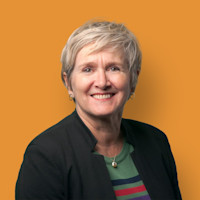Twice a year, SIDN Fund holds a grant application round, when project organisers can seek support for their schemes. The first application round of 2016 is now complete and the second one will soon be starting. It's an ideal time, therefore, to hear from the Fund's CEO Valerie Frissen about what's been achieved so far and what the ambition for the future is.
The first application round of 2016 ended a while ago. How do you feel it went?

"I was very pleased, both with the number of applications we received and with their quality. Nevertheless, there weren't quite as many pioneer project applications as I would have liked. Pioneer projects are smaller, more experimental projects. Pioneers tend not to be as streetwise when it comes to securing funds, so we will be looking to increase our familiarity to that target group. We plan to organise meetings at universities of applied sciences, and we'll be running a workshop at the forthcoming Border Sessions Festival. Another thing that we want to address is the number of applications for business-to-business-type projects. We received a lot in the first rounds, although our primary focus is social value. We have therefore redefined our project criteria and devised a mechanism that allows people to informally run ideas by us before making an application. It helps everyone if project organisers know whether there is any prospect of an application succeeding. I'd advise anyone who is thinking of applying to fill in our pitch form. It can save a lot of disappointment."
Does SIDN Fund have further initiatives planned?
"One innovation is the Internet Thesis Prizes, which we have teamed up with Google, Brinkhof Advocaten, Greenhost and the KHMW to introduce. In April, theses were recognised in each of four categories. SIDN Fund sponsors the prize for the best thesis in the category Internet & Society/Humanities. We were very impressed by the quality of the nominated theses and we plan to award the prize annually from now on. Then, in the autumn, we will be making it possible to apply for assistance with academic research. That will more or less conclude the rollout of what we've already got planned."
Is it yet possible to say what the funded projects have achieved?
"Generally speaking, it's too early to say much about the social impact of the projects. There are exceptions, however. One of our funded projects, Code Hour, which introduces children to programming, is already achieving impressive results in terms of publicity, number of participating schools, teaching packs used and so on. Supported projects from the first application round of 2015 are now moving towards completion. We don't want promising initiatives to fizzle out after one project, so we look at ways of providing further assistance. In some cases, we have made additional grants to help projects through a follow-up phase. That happened with a project run by Bits of Freedom, helping start-ups to establish responsible policies on data protection and privacy. In other cases, we put project organisers in contact with other financiers, experts or relevant networks. Also, we will soon be organising a series of meetings for the exchange of knowledge and experience. Or workshops devoted to particular themes, such as the recent workshop on project positioning. Our efforts to provide extra support have gone down very well with our project organisers, so we will certainly be continuing along that path."
What kinds of project are you expecting in the next application round?
"Certain themes do seem to be prominent, such as programming for children, accessible encryption, the Internet of Things, and big data and privacy. I'm also expecting a number of applications relating to blockchain. However, as in the previous application rounds, we are open to whatever good ideas people may have. The only proviso is that the project is consistent with our objectives: to make the internet stronger, to increase the knowledge and skills of internet users, and to generate added value for the community. We are considering tying future application rounds to particular themes. By targeting our efforts, we might be able to increase our impact."
Did the most recent application round bring any interesting projects?
"Absolutely. We've had applications for some great projects. The pioneer project applications included various educational schemes, a plan for helping people build their own smart devices for gathering information to help the neighbourhood, and the world's first crowd-acting platform. In the 'potentials' category, we've had some strong applications as well. There's Tom Kabinet, for example: an online shop for second-hand e-books. The books sell for a little more than two euros, of which fifty cents goes to the writer. The idea has met a lot of opposition; the people behind the project have had to fend off law suits from a number of publishers. We are also funding two projects that aim to help refugees, a project that focuses on 'unreliable devices' and a lovely project that converts mathematical graphs into sound, so that blind people can hear them. It continues to be a real pleasure, being able to help people with these great ideas."
Looking for support?
Interested in getting a project grant from SIDN Fund? Then do the quick scan on the Fund's website or pitch your idea using the web form. That way you can quickly see whether your project has a chance of securing financial support from the Fund.



